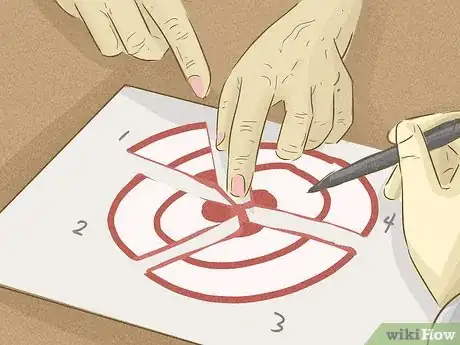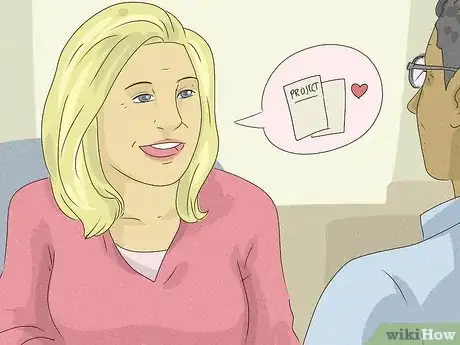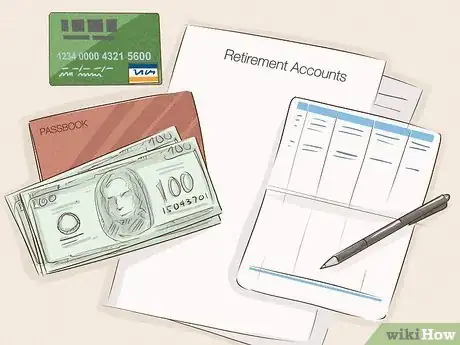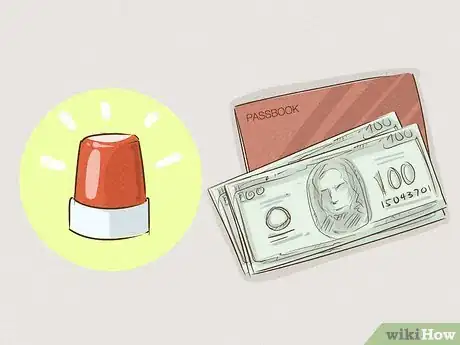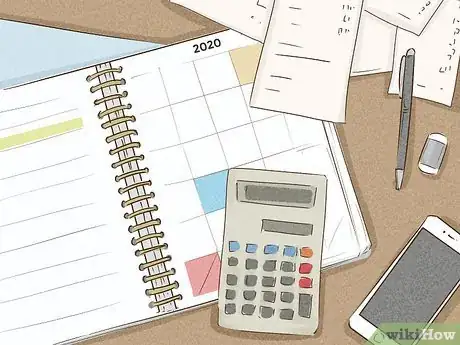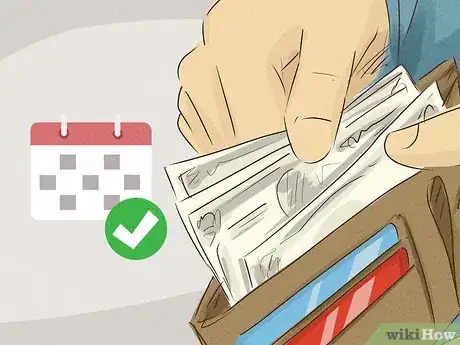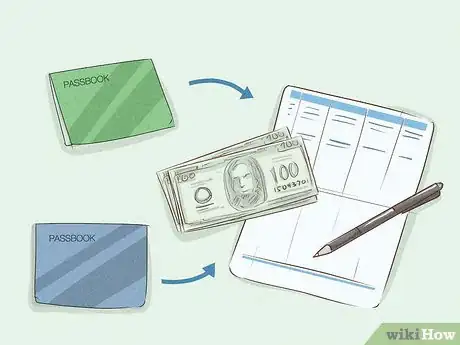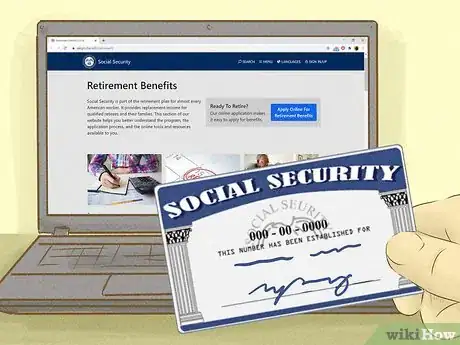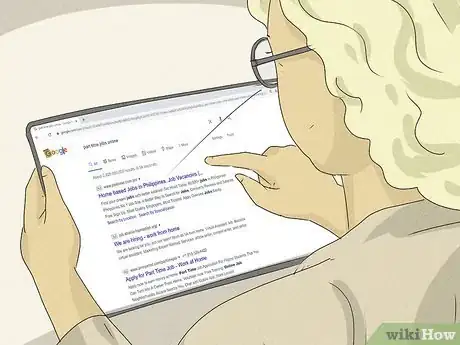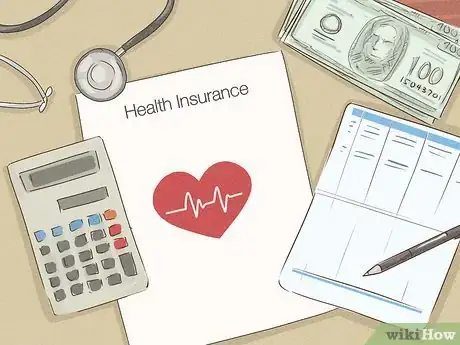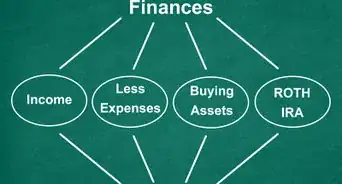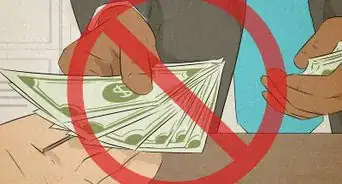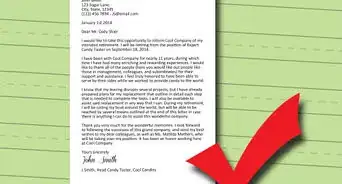This article was co-authored by Alan Mehdiani, CPA and by wikiHow staff writer, Hunter Rising. Alan Mehdiani is a certified public accountant and the CEO of Mehdiani Financial Management, based in the Los Angeles, California metro area. With over 15 years of experience in financial and wealth management, Alan has experience in accounting and taxation, business formation, financial planning and investments, and real estate and business sales. Alan holds a BA in Business Economics and Accounting from the University of California, Los Angeles.
There are 17 references cited in this article, which can be found at the bottom of the page.
This article has been viewed 10,390 times.
It’s really exciting when you’re in the home stretch before retirement. You’ve put in a lot of time and effort into your job and you’re almost ready to sit back and relax. While you should be proud of what you accomplished, it’s completely normal if you’re feeling a little stressed out too. It might be harder to focus on your work, or you may worry about your finances and health. Luckily, there are a lot of things you can do in your final year on the job to stay busy and prepare. Retirement is a time where you should relax after all of your hard work, so planning ahead will help take some of that stress off of your shoulders!
Steps
Staying Motivated at Work
-
1Mentor coworkers that will take over your role. It will be hard to replace you at work since you’ve done so much, but someone will have to fill your role once you leave. Give your younger coworkers advice and look for opportunities where you can assist them. If you’ve learned any helpful tips or tricks that help you stay productive, pass down the information so the company can still work efficiently even when you’re gone.[1]
- Your boss may also have you train a new employee if they hired someone outside of the company to fill your position.
-
2Break large projects into smaller tasks. Large projects may seem daunting because you might feel rushed to complete them before you retire. Rather than stressing about seeing the project through to the end, separate the task into smaller, manageable goals that are easier to complete. As you work through each goal, focus on the aspects that you’re enjoying and track your progress. Even if you don’t finish the project before you retire, you should still feel proud of what you accomplished.[2]
- Having manageable goals also helps your coworkers pick up where you left off.
- Try to set goals that motivate you intrinsically. For example, don’t set a goal just because you’ll get a reward at the end. Instead, choose goals that you’ll feel proud of completing.
Advertisement -
3Ask for projects that you’re passionate about. When you’ve put in so much hard work, you might have more options for what tasks you’d rather do during your final year. Reach out to your boss and let them know what you’d really like to pursue before you leave. You might try to find ways to make workflow more efficient for your coworkers or take on a new initiative that will make the company more profitable. Discuss your options with your boss so work still feels fulfilling.[3]
- Think about what you want to be remembered for after you leave and see if you can tackle those projects.
- Don’t get discouraged if your boss keeps you on other projects that you don’t care for. You’ll be able to pursue what you want to once you retire.
-
4Speak up about concerns you have at the company. It can be pretty scary to bring up problems at work if you just started, but you won’t feel as stressed addressing them just about to retire. Avoid being disrespectful or offensive, but point issues that you’ve noticed out to your boss or coworkers. Try to offer solutions that could lead to changes in the company culture in the future.[4]
- Talking about the issues can also help you feel less frustrated at work or make your coworkers appreciate you more.
-
5Download a countdown app to keep track of how many days you have left. You’re probably feeling antsy and excited as you get closer to your last day. Find an app on your phone or computer and put in the day when you’re retiring. That way, you can get a daily reminder of how close you are to being done and recognize how much time you’ve put into the company.[5]
- For some people, seeing a countdown clock can add more stress to get work done. If you’re feeling anxious every time you see the countdown, you don’t need to use it.
-
6Maintain good connections with any clients you have. If you work primarily with clients at your job, you’ve probably made some really close connections that you don’t want to lose. Let them know that you’re retiring and connect them to the person that’s taking over for you. Tell your clients that you’ve appreciated them and ask them if there’s anything you can do to help them during the transition.[6]
- Depending on your line of work, you might be able to ask your clients if you can do side work for them once you retire. For example, you might be able to become a coach or consultant if their company allows it.
Planning Your Finances
-
1Put as much money into retirement accounts as you can. Try to start saving early so your money has time to build interest. Take as much out of your current paycheck as you can to invest in retirement funds and savings plans. Even if you can’t add a lot of money to your account right away, try to increase the amount you’re putting in every month.[7]
- Depending on the company, your employer may have also been matching your contributions and made your retirement fund grow even more!
-
2Set aside money for emergencies. You never know when you’ll need to spend money on home repairs or health emergencies, so make sure you have a safety fund for large expenses. You may need to cut back on other purchases each month, but you won’t have to take as much out from retirement accounts.[8]
- Try to have at least 1 month of expenses in savings just so you have a safety cushion.[9]
-
3Create an itemized monthly budget to estimate your retirement expenses. Even if you’re responsible with your money, you might not realize how much you’re actually spending. Write down all of the things you need to spend money on every month, including rent or mortgage, car payments, insurances, groceries, and any other regular expense. Once you track an entire month, you can estimate how much you’ll need to use from retirement funds.[10]
- You’ll typically need about 80% of your pre-retirement income after you leave your job.[11]
-
4Try living on your monthly retirement budget. Estimate how much retirement income you’ll have for everyday expenses, such as food, gas, and entertainment, after you make regular payments on housing, taxes, and health care. Once you find out how much money you’d have leftover, limit your spending to that amount for the rest of the month. If you find that you spend more than your retirement budget, look for ways to cut back on spending.[12]
- For example, you may not be able to go out to eat as frequently as you do now. Instead, you might buy cheaper groceries and prepare meals at home.
- Try to cut back your expenses to even less than what you'll draw from your retirement. The less you have to take out of your retirement accounts each year, the less you're going to pay in taxes.[13]
-
5Take out or refinance loans if you need to. A lot of creditors are hesitant to lend money once you’re retired, so talk with them while you’re still working to see what you can do. Let them know that you’re approaching retirement and ask what options are available. That way, you can save money or make cheaper payments so it’s not as much of a financial burden.[14]
- If you’re planning to splurge on any large purchases, such as a car, house, or RV, try to buy them while you’re still employed so you can get better financing. Even if you have the money after retirement, you might not get lower rates.
-
6Combine your retirement savings accounts for lower costs. You probably have retirement funds split between multiple 401(k) or IRA accounts, but it’s hard to keep track of your money and fees when they’re separated. Talk to a financial advisor about transferring all of your assets to a single account so it’s easier to avoid fees and access your money.[15]
- You can take money from a 401(k) account without fees when you retire at 55 or later.
- IRA accounts will usually have a 10% fee for pulling out money before you turn 59 ½.
-
7Apply for Social Security benefits if you’re 62 or older. Social Security will help replace some of your income after you retire, but you only qualify if you’re over 62. If you want access to the benefits, you can apply up to 4 months beforehand as long as you’re going to be 62 when you retire. Fill out your application on the Social Security website early so you’re able to address any issues before you need your payments.[16]
- You can apply for Social Security benefits here: https://www.ssa.gov/benefits/retirement/.
- Social Security checks will start a month after you start the program. For example, if you go on Social Security in June, you won’t get your first check until July.
-
8Keep your eyes open for part-time jobs if you still need more income. We know that you’re ready to relax and rest after years of hard work, but It’s okay if your benefits and retirement funds can’t completely cover your expenses. If you want some extra spending money, try to pick up a few hours of work during the week. Talk to your current employer to see if there are any opportunities where you can work part-time if you need to. Otherwise, you can try reaching out to past clients or find local part-time jobs to help you balance your income.[17]
- Try to find something that requires similar experience to what you’ve already done since starting a completely new career can be very difficult.
Staying Healthy
-
1Look for health insurance if you’re retiring before you’re 65. You’re eligible for Medicare once you turn 65, but you’ll need additional healthcare coverage if you’re retiring early. Talk to your employer to see if you can continue getting coverage through them. Otherwise, you may need to look for public and affordable healthcare options so you can afford to visit a doctor.[18]
- You will need to cover 100% of your health insurance cost, so it will be more expensive than your employer’s plan.
-
2Get dental work done if your job provides dental insurance. Medicare and other healthcare options don’t usually offer dental services, so make an appointment while you’re still employed. Ask if you need any major work done and schedule surgeries while you have coverage. If you don’t have dental insurance, then you’ll need to cover the expenses yourself.[19]
- You can apply for separate dental insurance outside of your healthcare plan if you’re able to afford it.
-
3Take up new hobbies you’re interested in. After years of work, you can finally use your time to explore things you’re passionate about but didn’t get a chance to do in the past. Add 1–2 new activities to your daily routine that you’ve always wanted to try, such as gardening, painting, cooking, or starting a book club. Dedicate your time to your new hobbies so you can stay mentally active and involved.[20]
- Be careful not to add so many activities to your routine that it stresses you out.
- Check local community centers to see if they’re offering any classes that you’re interested in taking.
-
4Find ways to socialize with others outside of work. You’ve probably made a lot of friends at work, but you won’t see them every day once you retire. If you want to stay connected with your coworkers, get their contact information so you can reach out to them. You can also start volunteering, attending group activities, or traveling so you have opportunities to meet new people and continue friendships.[21]
- Check online or at community centers to see if there are any hobby groups that get together.
-
5Exercise to relieve stress and stay healthy. You’ll be able to enjoy a long and healthy retirement if you stay physically active. Try to make some time during the week where you can go on walks or do some light workouts. It might feel a little tough at the start, but you’ll start feeling more energized and be able to do more of the things you enjoy.[22]
- Be careful not to overstress your body. Only work out as much as you’re comfortable doing so you don’t get injured.
Expert Q&A
Did you know you can get expert answers for this article?
Unlock expert answers by supporting wikiHow
-
QuestionWhat should I consider before retiring?
 Alan Mehdiani, CPAAlan Mehdiani is a certified public accountant and the CEO of Mehdiani Financial Management, based in the Los Angeles, California metro area. With over 15 years of experience in financial and wealth management, Alan has experience in accounting and taxation, business formation, financial planning and investments, and real estate and business sales. Alan holds a BA in Business Economics and Accounting from the University of California, Los Angeles.
Alan Mehdiani, CPAAlan Mehdiani is a certified public accountant and the CEO of Mehdiani Financial Management, based in the Los Angeles, California metro area. With over 15 years of experience in financial and wealth management, Alan has experience in accounting and taxation, business formation, financial planning and investments, and real estate and business sales. Alan holds a BA in Business Economics and Accounting from the University of California, Los Angeles.
Certified Public Accountant
-
QuestionHow can I reduce the taxes I owe during retirement?
 Alan Mehdiani, CPAAlan Mehdiani is a certified public accountant and the CEO of Mehdiani Financial Management, based in the Los Angeles, California metro area. With over 15 years of experience in financial and wealth management, Alan has experience in accounting and taxation, business formation, financial planning and investments, and real estate and business sales. Alan holds a BA in Business Economics and Accounting from the University of California, Los Angeles.
Alan Mehdiani, CPAAlan Mehdiani is a certified public accountant and the CEO of Mehdiani Financial Management, based in the Los Angeles, California metro area. With over 15 years of experience in financial and wealth management, Alan has experience in accounting and taxation, business formation, financial planning and investments, and real estate and business sales. Alan holds a BA in Business Economics and Accounting from the University of California, Los Angeles.
Certified Public Accountant The first thing to do is to try to reduce your expenses. The lower your cost of living, the less you're likely going to have to take out of your retirement accounts every year. The less you take out, the less you'll pay in taxes. Also, if you're married and filing jointly, you won't pay more than 12% in federal income taxes if you keep your combined income under $80,250. You won't have to pay taxes on long-term capital gains and qualified dividends in the year that you receive them.
The first thing to do is to try to reduce your expenses. The lower your cost of living, the less you're likely going to have to take out of your retirement accounts every year. The less you take out, the less you'll pay in taxes. Also, if you're married and filing jointly, you won't pay more than 12% in federal income taxes if you keep your combined income under $80,250. You won't have to pay taxes on long-term capital gains and qualified dividends in the year that you receive them.
Warnings
- Keep track of your expenses so you don’t overspend your retirement funds.[24]⧼thumbs_response⧽
References
- ↑ https://hbr.org/2018/09/the-ceos-guide-to-retirement
- ↑ https://hbr.org/2018/11/how-to-keep-working-when-youre-just-not-feeling-it
- ↑ https://ournextlife.com/2016/10/17/early-checkout/
- ↑ https://money.usnews.com/money/blogs/on-retirement/2015/03/04/a-to-do-list-for-the-year-you-retire
- ↑ https://www.theretirementmanifesto.com/20-steps-to-take-in-the-year-before-retirement/
- ↑ https://ournextlife.com/2016/10/17/early-checkout/
- ↑ https://www.dol.gov/sites/dolgov/files/EBSA/about-ebsa/our-activities/resource-center/publications/top-10-ways-to-prepare-for-retirement.pdf
- ↑ https://www.forbes.com/advisor/personal-finance/emergency-fund-for-retirement/
- ↑ https://www.cnbc.com/select/how-much-to-save-in-emergency-fund/
- ↑ https://money.usnews.com/money/retirement/articles/2015/06/08/countdown-to-retirement-dos-and-donts-for-your-final-working-year
- ↑ https://www.aarp.org/retirement/planning-for-retirement/info-2020/how-much-money-do-you-need-to-retire.html
- ↑ https://www.aarp.org/retirement/planning-for-retirement/info-2019/1-year-countdown.html
- ↑ Alan Mehdiani, CPA. Certified Public Accountant. Expert Interview. 9 July 2020.
- ↑ https://money.usnews.com/money/retirement/articles/2015/06/08/countdown-to-retirement-dos-and-donts-for-your-final-working-year
- ↑ https://www.aarp.org/retirement/planning-for-retirement/info-2019/1-year-countdown.html
- ↑ https://www.aarp.org/retirement/planning-for-retirement/info-2019/3-month-countdown.html
- ↑ https://www.aarp.org/retirement/planning-for-retirement/info-2019/1-year-countdown.html
- ↑ https://www.forbes.com/sites/davidrae/2020/07/23/mastering-the-last-five-years-before-retirement/#3f22eda94009
- ↑ https://www.aarp.org/retirement/planning-for-retirement/info-2019/1-year-countdown.html
- ↑ https://www.nia.nih.gov/health/participating-activities-you-enjoy
- ↑ https://money.usnews.com/money/retirement/articles/2015/06/08/countdown-to-retirement-dos-and-donts-for-your-final-working-year
- ↑ https://money.usnews.com/money/blogs/on-retirement/2015/03/04/a-to-do-list-for-the-year-you-retire
- ↑ https://hbr.org/2018/09/the-ceos-guide-to-retirement
- ↑ https://www.aarp.org/retirement/planning-for-retirement/info-2019/1-year-countdown.html

